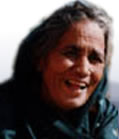 |
 |
||
 |
|||
|
GLOSSARY India glossary |
transcript |
| Section 1 | Transcript starts part-way through interview. |
What change has come about in the society of women? In a joint family women have less work. But in separate families their workload has increased. The only change is that now women do not want to marry three men - they refuse. This is the trend in the younger generation and it is the major change. Earlier it used to be different. My father-in-law for instance had married my younger mother-in-law who is the wife of my younger father-in-law. My mother-in-law was very young in age as compared to my father-in-law. So he later married a girl of his age and gave her to his younger brother. This was in the old time. |
|
Is it true that people of older generation used to wash the feet of their guests? Yes, it used to be done. 18 years ago people used to do it. When a guest came, not only were all the family members' feet washed in warm water but also the feet of the guest. As the family members massage their feet with oil, the guest was also given a foot massage. You are tired after all the work, so we will do the massage. Nowadays a bucket of warm water is given to wash their hands and feet by themselves. No one does the massage anymore. People from outside spoke badly about the people of Jaunsar because of this custom. Now we offer hospitality, but not by washing the feet. Even the feet of family members are not washed. |
|
You live here. Does this mean that you have left agriculture? No, we have not. We do it now by employing labour. I myself do the farming as well. But to look after the animals and fields alone is very difficult. Children have to study, so I come with them from the village and stay here. This is the place where we keep our animals. Since the school is here we have also started living here - otherwise it is not possible to live in the cold here. Now we are on our way to the village. The children's winter holidays will start and we will go down to our houses. It is less cold there in the valley. The whole house is of wood and stays warm. Here the walls are of cement and only the floor is wooden, therefore, the house is cold. Since the floor is made of cement, we will not be able to put our feet on the floor due to the cold. Only a wooden floor can do for survival here. Since our labourers do us a service we have to pay for ploughing our land. We have bulls but the labourer uses them. I get the grass and wood, as I am alone. I do not have a devrani or a jethani (younger and elder brothers’ wives). [Her husband is the only son with three sisters, two of whom are married. The youngest is studying.] |
|
| Section 2 | How do you arrange for delivery [of babies] in the village? We arrange for the child in the obara (lower storey) because the animals can be tied in a separate cow house. The lower room is warm and the floor is plastered with mud. |
Are there midwives in the village? Yes, many women of our village are midwives, too. They have plenty of experience. |
|
Have they been trained anywhere? Right now, the hospital is conducting a training course for midwives. It is for the local midwives. No, they have not been trained anywhere. Earlier a woman used to have nine to 10 children, sometimes even 12 children. Midwives used to do all the work. No one from the younger generation has any knowledge of how to do this work. No one from among them will be able to take over as the local midwife of the village. |
|
This village lies in a very deep valley. Bringing the women here in such a condition must be a difficult job. How do you bring them here? Oh no, we do not bring them here. We consult the doctor here and a midwife or nurse goes to the village. The women of our village feel too shy to deliver their babies in the hospital. So the midwives are called home. If the midwife feels that she cannot handle the case then the patient is brought to the hospital. Sometimes the hospital advises them to take the patient outside to deliver but they are told in advance. |
|
Does the hospital give advice on immunisation of babies? Is there awareness in the public here? Yes, people bring their children here. |
|
There are no roads in the hills ahead. What do you think happens in the villages there since they are quite far away? In many villages they do not go for immunisation. |
|
How many doctors are there here? Only one. The midwives have a lot of knowledge and they handle everything. People give them whatever they can of their free will for their services. |
|
What do the midwives who belong to the village get? They are not given anything. They are only offered food. People in the village do not charge anything from one another for such work. It is considered bad. |
|
There have been elections everywhere and women village heads have been elected. Has a woman been elected as the village head here? No. In our gram sabha (village assembly) a man has been elected as the head, but in another village assembly a woman has been elected. She is perhaps educated and stays in Chakrata. She is around 45 years of age. One of my sisters-in-law has also become the head. |
|
Is she educated? No. She could not study as she was the eldest daughter. The second daughter studied a bit. But because she was the eldest, she was busy with the household work. But when she stood for the women's seat in her hometown she won. Her husband was very supportive, that is why she was able to win. But she will not need to do anything, her husband will do all the work. The work will be done by her husband - and the name will be hers! She will only sign when she is asked to. She doesn’t know anything else. My father also used to be in service and stayed away for long periods. But my mother never thought of educating me, because I was the oldest among all the sisters. If I had gone to school who would help our mother in the household work? My younger sister studied and my five brothers also studied. Now they are all in service, but my share of study went away in farming! Even now my father scolds my mother, that you did not let her study, you have made her illiterate, you have spoiled her life because of your work. At the time my aunt's elder son had died. We had many goats. Who would have taken care of them? Therefore, I worked in place of my brother (cousin). |
|
| Section 3 | What is your name? Prabha. |
What is your age approximately? Around 54 years. |
|
Your husband does not drink. That is very commendable. Yes, he does not drink. In fact he tries to stop his father also from drinking. But they do not listen. Here even old women drink. My mother-in-law also drinks sometimes. My husband is very nice. When I get tired working alone I sometimes get angry at him. He tries to reason with me, he does not get annoyed and shout back at me. He does his work and listens to whatever I say quietly. |
|
How is the birth of a child celebrated? On the third, fifth, seventh or ninth day, as the priest says, incense is offered. On this day, til (sesame seed), jaggery (unrefined sugar) and rice are mixed and distributed among the children. We call it sirni. The child is given his first bath four times in warm water. We believe that the more a child is bathed the healthier he will be, and grow fast. We do not massage the baby. We rub the oil of chulu (apricot), but do not massage it. If we do not have chulu oil at home then we get it from some other village. We ourselves also use chulu oil. A ten to twelve day old baby and mother, both bathe four times. |
|
When does the new mother come out for work? My father-in-law did not eat in the house after a birth for ten days. He used to go to different houses each day and eat there. In the case of a boy we cannot worship God in the house till three months are over. It is considered impure. We cannot even go to the temple for three months. While if it is a girl it is around a month. A boy is considered special. |
|
After the birth who does the cleaning? In the village up ahead the mother herself cleans her clothes. One of our girls died there. But in our village the mother-in-law or other women of the house do the cleaning. We do not give rice and cold water for three months and the mother does not touch cold water for 20 to 25 days. If a woman is alone at home, she calls her sister-in-law at the time of her delivery. The girls of the village also help. They feel that helping at such times is a good thing. They do not take any money for this work. |